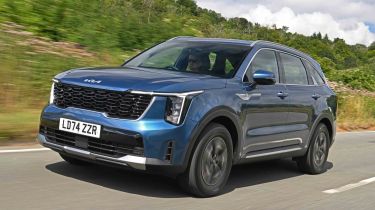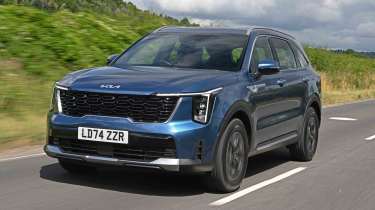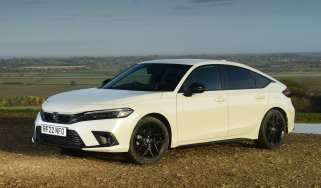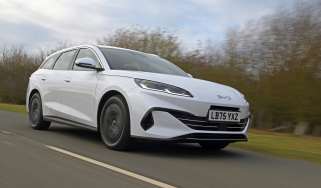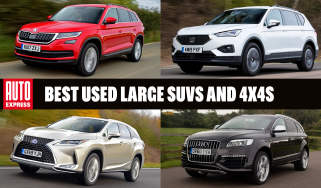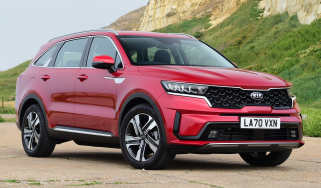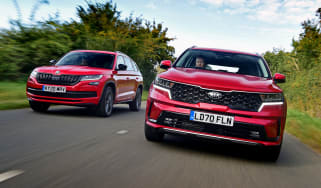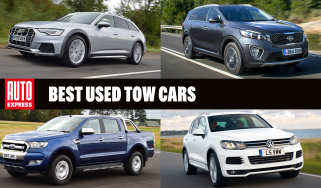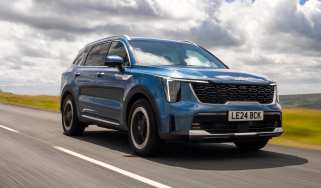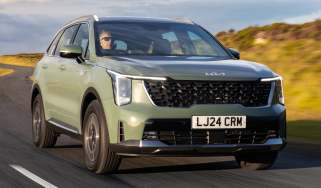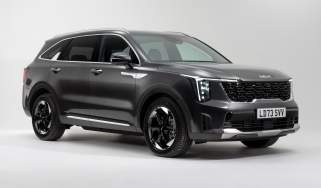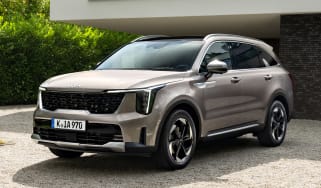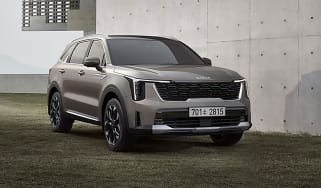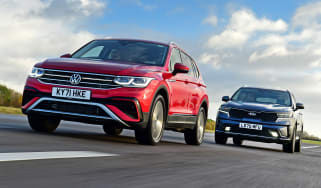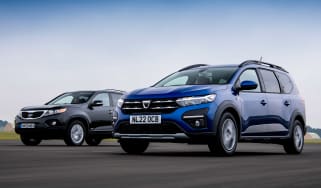Kia Sorento review
The Kia Sorento is a top-class family SUV with plenty of kit and space, although it's expensive to buy

Our opinion on the Kia Sorento
Seven-seat SUVs might seem like an alternative to people carriers, and for the most part, they are - but the Kia Sorento looks able to cater for a wider range of buyers with its standard-fit four-wheel drive and range of plug-in hybrid, hybrid and diesel powertrains. There’s no all-electric option, but that gap is filled by the similarly-sized Kia EV9.
Over the years, the Kia Sorento has evolved from being a large, practical and cheap family SUV into a large, practical and classy one. The price has shifted in line with the upturn in quality, design and technology, but you do get a lot of equipment and technology included as standard. The difference now is that the Sorento is up against some first-rate rivals in the seven-seat SUV market.
About the Kia Sorento
Since its launch in 2002, the Kia Sorento has been a dependable, if a little staid, spacious family SUV, throughout its first three generations. It wasn’t until the Mk4 edition was launched in 2020 that the model was injected with a little more style, adopting an American-inspired look from the US-market Telluride.
A facelift in 2024 tweaked its look ever so slightly, bringing the design more closely in line with the brand’s electric range, including the Kia EV3 and Kia EV9.
Used - available now

2022 KIA
Sorento
41,097 milesAutomaticDiesel2.2L
Cash £29,000
2022 KIA
Sorento
65,833 milesAutomaticPetrol1.6L
Cash £23,500
2022 KIA
Sorento
24,604 milesAutomaticPetrol1.6L
Cash £31,700
2022 KIA
Sorento
42,183 milesAutomaticPetrol1.6L
Cash £28,346So far, we’ve tested both diesel and hybrid versions of the Sorento extensively on UK roads. We’ve also twin-tested the Sorento multiple times against its rivals, the latest test was with the facelifted Kia Sorento against the Peugeot 5008, where we found the Sorento provides the most overall space, but the Peugeot wins out because of its greater efficiency and more premium interior.
Kia Sorento prices and latest deals
Due to coming as standard with a high level of kit and seven seats as standard, the latest Sorento isn’t all that inexpensive when it comes to large SUVs. The least expensive 2 trim 2.2 CRDi diesel comes in at over £42,500, which is around £500 more than our favourite large SUV, the Skoda Kodiaq, in equivalent diesel seven-seat guise. You can get the Kodiaq for even less in pure petrol five seater form. The hybrid Sorento costs around £44,000, while the plug-in hybrid is a little over £47,500.
Check out our latest new car deals and leasing deals for the top offers available now on Auto Express. And don't forget we can help you sell your car, too.
Performance & driving experience
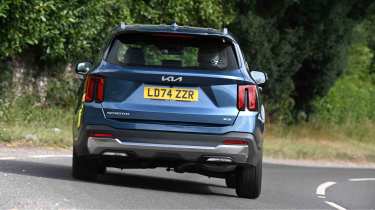
Pros |
|
Cons |
|
It’s common to see electrification throughout many large SUV models’ engine line-ups these days, and there is still the occasional diesel option around, too. Kia is rare in offering buyers a choice of a diesel, full hybrid and plug-in hybrid all in one vehicle. Four-wheel drive is standard no matter what Sorento engine you pick, and there’s a Terrain Mode function, which is essentially a set of driving modes that alter various parameters of the car’s set-up according to the terrain under the tyres. Land Rover’s Terrain Response system was clearly the inspiration.
The driver can select Mud, Snow and Sand modes, as well as introduce bespoke settings for the gearbox, ESC stability control and 4x4 system that are optimised for the different conditions. There are no locking differentials or low-range gearboxes, so don’t think of the Sorento as an extreme off-roader, but it should have enough muscle and grip to get you out of a muddy car park or up a snowy mountain road to a ski resort, should the need arise.
There’s no fully electric version, because the Kia EV9 covers that in the brand’s range.
Performance, 0-60mph acceleration and top speed
The Sorento Hybrid has a 1.6-litre T-GDi turbocharged petrol engine, a six-speed automatic gearbox and a 1.49kWh battery pack – mounted under the front seat – feeding a 59bhp electric motor for a combined output of 212bhp and 367Nm of torque. The 0-62mph sprint is covered in 9.7 seconds, before topping out at 113mph.
Above that sits the Sorento PHEV. The plug-in hybrid powertrain uses the same petrol engine and gearbox as the HEV, but the battery grows to 13.8kWh and the electric motor offers a 90bhp boost. That makes for a combined output of 248bhp, with the same 367Nm of torque. The 0-62mph dash takes 8.8 seconds and the top speed is 113mph.
The 2.2-litre diesel makes 190bhp, which is slightly down on the hybrid’s output, but it’s much more torquey, with 440Nm. A 9.7-second 0-62mph time is a match for the hybrid, too. It accelerates smoothly and gently eases the power in, with the engine only getting loud at the top end of its rev range. The eight-speed gearbox works very well; its changes are a little lazy, but all but imperceptible most of the time.
The full hybrid powertrain seems suited to buyers who aren’t bothered about accessing the substantial company-car tax breaks that come with the plug-in hybrid, or who don’t need the diesel’s muscle. Its HEV powertrain is pretty refined unless you push it hard, at which point the engine starts to sound coarse. The electric element of the powertrain makes it smooth and quiet to drive at low speeds, but the motor regen could engage more smoothly when trying to gently decelerate.
| Model | Power | 0-62mph | Top speed |
| Sorento 1.6 HEV 2 | 212bhp | 9.7s | 113mph |
| Sorento 2.2 CRDi 2 | 248bhp | 8.8s | 113mph |
| Sorento 1.6 PHEV 2 | 190bhp | 9.7s | 124mph |
Town driving, visibility and parking
Light steering and that smooth hybrid powertrain make the Sorento quite civilised at low speed, but the brakes can be a little grabby when parking. It does feel fairly bulky in tight spots, while the likes of the Peugeot 5008 and Skoda Kodiaq are nimble and car-like in comparison.
The ride is quite soft overall, but there is a brittleness to it which can be felt over harsher bumps – even in the base 2 trim, despite the generous tyre sidewall the model rides upon.
Country road driving and handling
That ride comfort improves at speed, and the underlying softness of the Sorento’s suspension defines its character. This isn’t a car to be driven hard, but one to take roads at a relaxed pace.
The body control is adequate, grip is fine, and traction generally isn’t an issue because all Sorento models come standard with a four-wheel drive system that affords plenty of traction.
Although the Sorento’s steering is reasonably light, it responds naturally and loads up predictably through corners, which makes the Kia easy to place on the road.
Motorway driving and long-distance comfort
That soft set-up pays dividends on a motorway run, because the Sorento feels very soothing to drive at speed. Stability is strong and the steering remains accurate. Our main gripe comes with the road noise, which can be a little droney at higher speeds.
MPG & running costs
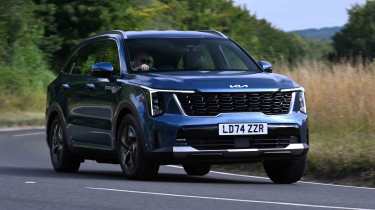
Pros |
|
Cons |
|
The diesel and the hybrid are pretty close in terms of their raw numbers. According to Kia, the diesel Sorento in basic ‘2’ trim can return up to 43.5mpg and emits 170g/km of CO2, and during a mixture of motorway and country roads, during our real world testing, we saw fuel economy in the mid 40s, which is pretty close to Kia’s official figure.
We found it a little more difficult to match the official economy figures in the self-charging hybrid Sorento. It has an official WLTP-rated fuel economy figure of 42.2mpg and CO2 emissions of 153g/km, and when we pitted the electrified Sorento head-to-head against a Nissan X-Trail it achieved 39.5mpg.
The plug-in hybrid Sorento PHEV has the highest fuel economy. Its official rating is 176.6mpg and 37g/km CO2, but there’s a caveat with plug-in hybrid cars: achieving such returns in the real world will be very difficult unless you charge the car religiously and stick to short trips that rely mostly on the electric-only range.
| Model | MPG | CO2 | Insurance group |
| Sorento 1.6 HEV 2 | 42.2mpg | 153g/km | 25 |
| Sorento 2.2 CRDi 2 | 43.5mpg | 170g/km | 30 |
| Sorento 1.6 PHEV 2 | 176.6mpg | 37g/km | 31 |
Electric range, battery life and charge time
Of course, the plug-in hybrid model has the potential for higher fuel economy figures, with frequent charging making the most of the Sorento’s 34-mile electric range. The maximum charging speed is 7.2kWh, so a suitably capable home wallbox charger should be able to fully recharge the 13.8kWh battery in around 3.5 hours.
Those figures were fine when the Sorento first came out, but newer rivals like the Skoda Kodiaq have over 70 miles of electric range and can even accept DC rapid charging, meaning you can complete a 20 to 80 per cent battery top up in under 30 minutes.
| Model | Battery size | Range | Insurance group |
| Sorento 1.6 PHEV 2 | 13.8kWh | 34 miles | 31 |
Insurance groups
The HEV runs with the lowest insurance groups of the Sorento line-up, ranging from groups 25 to 27 depending on trim level. The diesel ranges from groups 30 to 32, while the PHEV starts at group 31 and rises to 34 in the top-spec 4 trim.
The Skoda Kodiaq is going to be a cheaper car to insure, sitting in groups 12 to 30 depending on engine and trim, meanwhile, the Nissan X-Trail attracts ratings between groups 22 and 31.
Tax
With the HEV sitting in the 36 per cent Benefit-in-Kind (BiK) tax band and the diesel in the top 37 per cent bracket, it’s up to the PHEV version, starting in the 13 per cent band, to offer tempting company-car rates. A basic-rate income tax payer will face deductions of £1,219 for the PHEV in 2 trim, which is more than £1,800 a year cheaper than with the hybrid version.
No version of the Sorento escapes the luxury car tax surcharge that applies from the second time the vehicle’s annual vehicle excise duty (VED) is due, until the car is six years old.
Depreciation
The Sorento is impressively resistant to depreciation, maintaining between 53 to 62 per cent of its original value after three years or 36,000 miles.
For comparison, the Hyundai Santa Fe retains 53 to 56 per cent of its value, while the Peugeot 5008 and all-electric E-5008 maintain 49 to 52 per cent over the same period.
Interior, design & technology
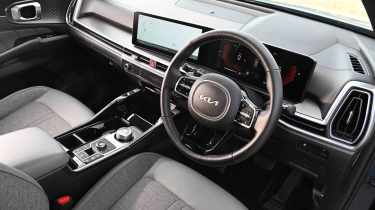
Pros |
|
Cons |
|
The Sorento is your typical bluff-fronted family SUV in shape, but Kia’s intention to continue its push upmarket is evidenced in some assured design touches. The mid-life refresh provided a similar face to the rest of Kia’s line-up, which is heavily influenced by the all-electric range of EV-branded Kia models, especially the Kia EV9.
LED headlights, front and rear parking sensors, a heated steering wheel and front seats, a 12.3-inch touchscreen with sat-nav, and adaptive cruise control are standard on every Sorento model. The 3 gains larger alloy wheels (increasing from 17 inches to 19 or 20 inches, depending on powertrain), side parking sensors, wireless smartphone charging, a powered tailgate, plus window blinds and heated outer seats in the second row, among other extras.
Moving up to the top-spec 4, and Kia’s best kit is at hand; a panoramic sunroof, Nappa leather upholstery, ventilated front seats, an electrically adjustable steering wheel and a digital rear-view mirror all feature.
Interior and dashboard design
The 2024 revision didn’t just change the Sorento’s exterior, the cabin received something of a glow-up, too. The latest model has fallen more in line with other Kias, featuring a dual-function panel where you can switch between climate and infotainment functions. The physical dials on either side are useful for adjusting volume or temperature, but we’d like to see a larger button to switch between settings. A pair of wide air vents is positioned above a touch-sensitive panel.
Overall, the design doesn’t quite have the wow-factor of the Peugeot 5008, nor can it quite match the excellent ergonomics of the Skoda Kodiaq.
Materials and build quality
The use of soft-touch materials in all the right places makes the Kia feel suitably plush, but the overall quality of the plastics and switchgear doesn’t quite feel a match for the Kodiaq or the superbly finished 5008.
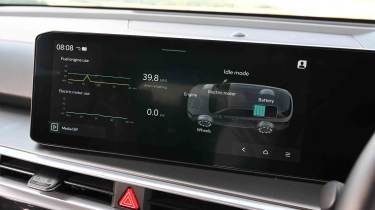
Infotainment, sat-nav and stereo
The facelifted Sorento gets a 12.3-inch touchscreen, which doesn’t have its rival’s razor-sharp and colourful graphics, but the basic system is fairly straightforward to use. At least, that’s if you don’t venture too deep beyond the main menu.
The digital driver’s display presents its information clearly, and it’s through here that you can adjust the driver-assist systems and delve into the trip computer functions in greater detail.
The Sorento also comes with UVO Connect telematic services that add live traffic information, weather and parking information into the mix. Using the phone app lets you send routes to the car in advance of your journey, too. The infotainment system can pair two phones at the same time via Bluetooth, so one could be playing music while the other makes a call. Of course, Apple CarPlay and Android Auto smartphone connectivity are standard, too.
There are loads of USB chargers with two in the front, three more in the middle row and a further pair in the boot/third-row area – there’s basically one for each occupant, while a wireless charging mat in the front means someone can even bring a second device with them.
“During our drive on the UK launch, we found that the black background on the infotainment and digital instrument displays made things hard to read in direct sunlight.” – Alastair Crooks, senior news reporter
Boot space & practicality
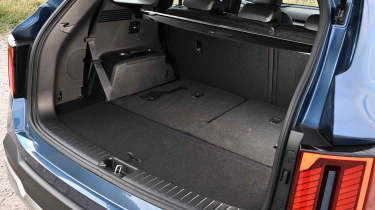
Pros |
|
Cons |
|
Cabin space is the Kia Sorento’s greatest strength, it makes good use of its sizable exterior dimensions, translating them into a spacious and user-friendly cabin. There’s generous space for four adults, and the two extra seats in the back are more comfortable than you’ll find on many rival seven-seaters.
Dimensions and size
This is a big vehicle, but it’s not up there with the largest seven-seat SUVs on the UK market. The Kia Sorento is 1,700mm tall, 4,815mm long and 1,900mm wide, which is longer and slightly wider than a Skoda Kodiaq (4,699mm and 1,882mm). It’s also significantly longer than the 4,597mm Land Rover Discovery Sport, but smaller than the full-size Land Rover Discovery (4,956mm long and 2,000mm wide).
| Dimensions comparison | |||
| Model | Kia Sorento | Hyundai Santa Fe | Skoda Kodiaq |
| Length | 4,815mm | 4,830mm | 4,758mm |
| Width | 1,900mm | 1,900mm (2,206mm inc mirrors) | 1,864mm (2,133mm inc mirrors) |
| Height | 1,695mm | 1,770mm | 1,659mm |
| Wheelbase | 2,815mm | 2,815mm | 2,791mm |
| Boot space | 179-1,996 litres | 179-1,949 litres | 340-2,035 litres |
Seats & passenger space
A lofty driving position offers plenty of adjustment for the driver. All versions come with seat height adjustment, but you’ll need 3 trim and above to get electrically adjustable front seats with electric lumbar adjustment on the driver’s seat. Visibility is good, with the squared-off bonnet making positioning the car easy. Large side windows make over-the-shoulder visibility reasonable, although we think it could be further improved if the glass line didn’t gently rise up towards the back.
Storage is generous; the huge bin between the front seats is wide and deep, while two large cup-holders, plus a small space to store the car’s key are ahead of it. A phone storage area sits behind a cover at the base of the dash.
In its five-seat configuration, the Sorento will comfortably take five adults. Knee room are plentiful, and the reclining backrests allow occupants to take a more relaxed seating position, but still be in reach of the large cup-holders stored in the door armrests. We didn’t have an issue with the amount of head- and elbow room the Sorento has, but our measurements show that the Hyundai Santa Fe is more generous in both those areas. That rival offers 903mm of headroom and 1,367mm of elbow room, while the Kia has 843mm of headroom and 1,355mm of elbow room. We also found that the centre seat in the Sorento is really just a temporary option; while its base is soft, it’s quite narrow, and the backrest is firm.
Access to the third row through the back doors is a little tight, but better than in some rivals. The middle seat back electrically drops and slides forward at the touch of a button, so you don’t have to fiddle around with awkward levers. The Sorento has a little more knee room than the 5008 and Santa Fe, according to our measurements (607mm of space versus 543mm in the 5008 and 564mm in the Santa Fe. However, the boxy exterior of the Santa Fe means that it has a little extra head- and elbow room at 903mm of headroom and 1,367mm of elbow room in the Hyundai versus 843mm headroom and 1,355mm of elbow room in the Kia.
Each third-row occupant gets a cup-holder, a USB-C port and an air vent. They can also adjust the fan speed in the back independently of those further forward.
All five rear seats are easy to fold; those in the middle row can be dropped using a pair of switches in the boot, while the back seats can be raised and folded easily, and the seats in front don’t obstruct their movement. There are four Isofix mounts for child seats, two in the middle row, and two in the third row.
Boot space
In seven-seat mode, the Kia’s boot trails the 5008’s by 80 litres. But the Sorento trumps its competitor in five-seat layout by 65 litres and 181 litres in two-seat format
In five-seat mode, the Sorento offers an impressive 628 litres of boot space, within a few litres of the Volkswagen Tayron’s volume. With all seats folded down – at which point an almost completely level area opens up – that volume grows beyond both the VW’s and the Santa Fe’s, with a total of 1,996 litres. It is a little trickier to lift bulkier items into the Sorento, however, because its 780mm boot lip height is higher than the 765mm we measured for the Tayron and 763mm for the Santa Fe.
Storage space drops dramatically in the Sorento with all seven seats in place, as you’d expect; only 179 litres remain in this layout, which is quite far behind the 345 litres of the Tayron. It’s still big enough to fit a couple of holdalls, or a row of shopping bags, and you can also make use of the plastic-lined compartment under the boot floor that would be handy for muddy boots or similar.
A parcel shelf can be used to cover the boot area when in five-seat mode. When it’s not in use, the shelf can be stored on the boot floor just behind the third row of seats. All Sorentos are supplied with a space-saver spare wheel, which is mounted under the car’s floor towards the rear.
Towing
The 2.2-CRDi diesel is the pick for towing; with a 2,500kg limit, it can haul more than twice as much as the HEV or PHEV powertrains. A Trailer Stability Assist function is standard on all models.
“The Hyundai Santa Fe is mechanically similar to the Sorento, but the Santa Fe is the marginally more luxurious option; it has the option of a six-seat layout, which replaces the second-row bench with a pair of captain’s chairs.” – Alex Ingram, chief reviewer
Reliability & safety
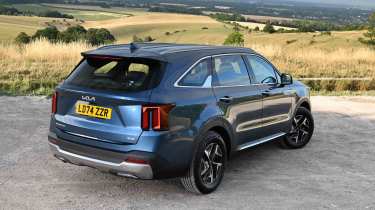
Pros |
|
Cons |
|
The Sorento was tested by Euro NCAP in 2020, so while its five-star rating was great at the time, NCAP’s testing has become more stringent since. Safety equipment is very strong throughout, though, but only the 4 trim gets standard airbags in the third row.
Forward Collision Avoidance Assist (FCA) scans the area in front of the car for pedestrians, cyclists and vehicles, while Intelligent Speed Limit Assist and Land Follow Assist help to control acceleration, braking and steering to keep you in lane and maintain a safe distance to the car in front – a great driver aid to take the strain off in stop-start motorway traffic, although the driver must always be poised to take control if needed.
Blind-spot assist with rear cross-traffic alert is also included, plus Highway Driving Assist (HDA) which automatically keeps you to the speed limit when the smart cruise control system is engaged.
Disabling certain driver-assist systems can be fiddly, and involves scrolling through sub-menus on the driver’s display to access another page on the main screen, with a scattered layout of options. Many rivals make this easier.
The Kia Sorento didn't make an appearance in our 2025 Driver Power customer satisfaction survey, but the Kia brand came 18th out of 31 manufacturers. That’s ahead of sibling brand Hyundai (20th), and in front of Ford (23rd) and Volkswagen (27th), but behind Nissan (15th), Skoda (12th), and Honda (10th).
| Euro NCAP safety ratings | |
| Euro NCAP safety rating | Five stars (2020) |
| Adult occupant protection | 82% |
| Child occupant protection | 85% |
| Vulnerable road user protection | 63% |
| Safety assist | 87% |
Buying and owning
Best buy: Kia Sorento 1.6 GDI HEV 2
Unless you regularly tow a trailer or caravan, the hybrid version of the Kia Sorento provides plenty of performance for everyday driving, and respectable fuel efficiency. No Sorento slips under the £40,000 luxury tax, which impacts running costs, so we’d suggest you save some money by sticking with the least expensive 2 trim level. This is a family car, so there’s no sense going all out for high-end versions with leather seats because even then, the interior isn’t going to feel as premium as the Peugeot 5008.
As a brand, Kia doesn’t really do options; if you want more kit, you’ll need to step up to the next trim level. Buyers can dip into the accessories catalogue to upgrade the standard 17-inch wheels to 19-inch alloys, though.
Company car drivers will be better off looking at the Skoda Kodiaq if they need low Benefit-in-Kind (BiK) tax, because the Kodiaq has over 70 miles of electric range and saves you nearly £5,500 from the cheapest Sorento plug-in. If you need a seven-seat plug-in, then the near 50-mile range 5008 plug-in hybrid has you covered, and starts from around £43,500.
Kia Sorento alternatives
In terms of direct rivals, the Sorento is in the mix with a clutch of desirable full-size seven-seat SUV options. The Skoda Kodiaq and Volkswagen Tayron from the Volkswagen Group, and the Peugeot 5008 are all worthy candidates. The Land Rover Discovery Sport is closer to the Sorento in price, even if the Kia isn’t far off the pricier Discovery in terms of practicality. The Sorento's sister model, the Hyundai Santa Fe, is a similarly practical seven-seater, as is the Nissan X-Trail that we’ve previously put head-to-head against the Sorento in hybrid form.
Used and nearly new Kia Sorentos
The history of the Kia Sorento dates back to 2002, with the Korean SUV evolving from a budget seven-seater into a more refined, mainstream model, able to compete with the class best. It's no longer a cheap option, but improvements in styling, interior quality and onboard tech reflect how much the Sorento has matured. Reliability has always been a plus point of Sorento ownership, and well cared for used examples should still prove dependable.
Kia Sorento history
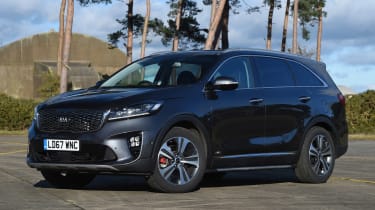
Kia Sorento Mk3: 2014-2020
The Mk3 Sorento came with a choice of five or seven seats, along with a strong 2.2-litre diesel engine. Buyers wanting some off road ability will probably look to the four-wheel drive versions, while there's also manual or automatic models to consider. Equipment levels are high across the range, with even entry cars including a DAB radio, Bluetooth, air-con, rear parking sensors, privacy glass and cruise control. Read our full Mk3 Kia Sorento buyer’s guide here…
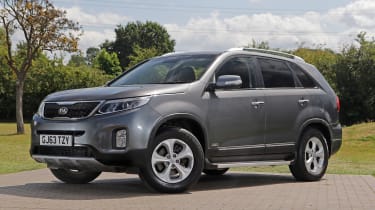
Kia Sorento Mk2: 2010-2014
As a capable seven-seat SUV with good towing capability, the Mk2 Sorento offered a reliable alternative to the agricultural Mitsubishi Shogun or Toyota Land Cruiser, while it undercut the significantly more expensive Land Rover Discovery on price. Both front- and four-wheel-drive examples are available, with petrol and diesel power featuring in the lineup. Read our full Mk3 Kia Sorento buyer’s guide here…
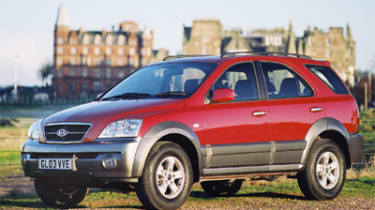
Kia Sorento Mk1: 2003-2010
The Mk1 Sorento was priced in a category below its size, which meant you got a lot of 4x4 for your money. It wasn't bad looking for the time and, tacky interior wooden trim aside, it was surprsingly well equipped too. Most examples came with a 2.5-litre diesel engine, although it didn't offer much pace.
Kia Sorento pictures
Frequently Asked Questions
All Kias get a seven-year/100,000-mile warranty, which ranks it among the most comprehensive packages in the industry.

